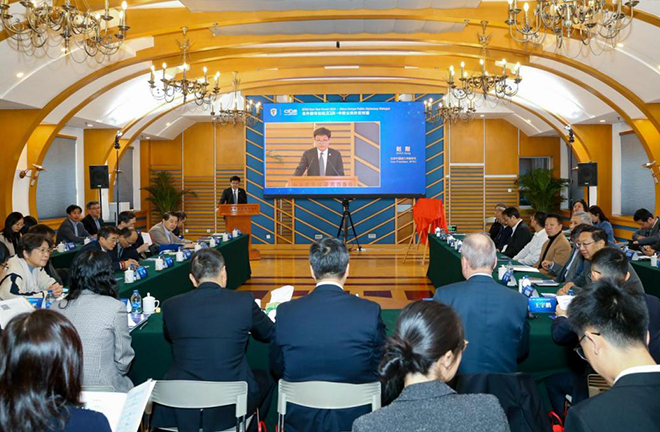More dialogue needed on China-Europe public diplomacy

A forum on European studies and China-Europe relations in early January in Beijing Photo: BFSU
The Beijing Foreign Studies University (BFSU) New Year Forum 2024—China-Europe Public Diplomacy Dialogue took place both online and offline in early January in Beijing. The main forum of the conference focused on the themes of “the European Model in Regional and Country Studies” and “China-Europe Dialogue and Cooperation in a Multipolar World.” The conference also witnessed the inauguration of the Center of the European Union and Regional Development Studies (CEURDS) under BFSU.
Developing win-win cooperation
BFSU President Yang Dan pointed out that as “two major forces, two major markets, and two major civilizations,” China and the EU have endured significant changes and consistently maintained a path of win-win cooperation. The establishment of CEURDS reflects the evolving times, the development requirements of China-Europe relations, and the necessity of advancing area and country studies. This contributes to the stable and enduring development of China-Europe relations and the building of a human community with a shared future.
As a mature example in area and country studies and a typical instance in applied research, Europe occupies a considerable position in the material, spiritual, and institutional progress of modern human history, calling for systematic investigation from multiple perspectives including political, economic, historical, geographical, and ideological history.
Forum participants concurred that the current shifts in China-Europe relations chiefly result from differences in mutual understanding. As such, both sides should adopt a global perspective to advance the progress of human civilization and acknowledge the roles of each in the global landscape. To achieve mutual benefit and win-win results, it is necessary to uphold the principle of seeking common ground while shelving differences, and strengthen dialogue and cooperation in the green, digital, technological sectors, industrial chain, and supply chain. In addition, by joining forces to address global challenges and eliminate differences through enhanced exchanges and mutual understanding, China and Europe can inject more certainty and positive energy into a multi-polar world, fostering the steady development of bilateral relations.
The sub-forums concentrated on the themes of “Development and Governance of European Modernization” and “A Multipolar Pattern, Great Power Games, and China-Europe Relations” respectively. European modernization is primarily a process of industrialization and urbanization. Its state construction modes, market operation modes, and social governance experiences offer both positive and negative references for China’s modernization today. Additionally, attendees focused on the status quo of great power games under the multi-polar pattern, the dynamics of multi-polarization and multilateralism, changes in relations among major powers such as China, the United States, the EU, and Russia, and the prospects of international and regional order. In view of the EU’s policy goal of “de-risking” the relationship, scholars clarified its connotation from the standpoint of international order, economic stability, and strategic security, suggesting that China and the EU re-examine the new development in their relations, seizing the precious opportunities to jointly uphold international strategic stability for mutually beneficial outcomes.
Comprehensive strategic partnership
China-Europe relations constitute one of the most important, comprehensive, and complex bilateral relationships in the world today, necessitating the continuous exchange of each other’s “three views” through ongoing dialogue. “China needs to form a comprehensive and in-depth view of Europe, while Europe works to establish an equal and objective view of China, jointly building an open and cooperative world view,” Yang added.
“As a channel to facilitate state-to-state and people-to-people exchanges, public diplomacy performs an irreplaceable role in promoting the China-Europe friendship,” said Luo Linquan, vice president of the China Public Diplomacy Association. As “two major forces, two major markets, and two major civilizations” in the world, China and Europe not only concern the development of both sides, but also the future and destiny of the world. The essence of bilateral cooperation lies in the complementarity of advantages and mutual benefit. It is an advisable option for both to act as practitioners of multilateralism, advocates of open development, and promoters of dialogue among civilizations, enhancing strategic mutual trust and win-win consensus, and fortifying the China-Europe comprehensive strategic partnership.
Attendees agreed that peace is the greatest common denominator. China and Europe have no structural contradictions and do not pose real threats to each other. Through strengthened exchanges and cooperation, it is certain that both sides can continuously consolidate strategic mutual trust and achieve common prosperity. They share a strong symbiotic relationship in the economic sphere and exhibit promising cooperative prospects in the digital economy, green finance, and especially the energy sector.
Edited by YANG LANLAN
